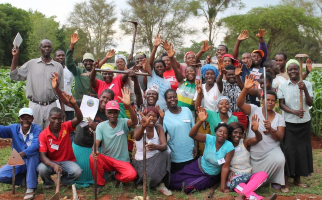
A number of Christian stewardship ministries do a wonderful job helping people get out of debt, grow in generosity, and otherwise learn how to manage money according to biblical principles. However, if you have a heart to see all of God’s people experiencing the freedom and joy of using such principles, what, if anything, can be done for the very poor? That’s a question the leaders of one such ministry, Crown, began wrestling with several years ago.
Especially as the ministry began bringing its financial stewardship materials to several particularly poor African countries, it became abundantly clear that, for many people, their greatest stewardship need was not about money.
“Most didn’t have money,” explained Crown Vice President of Global Outreach Handre de Jongh. “We needed to teach them stewardship of resources and the resource they really wanted was food.”
In Zimbabwe, Crown had established a relationship with an organization called Foundations For Farming, which mentors local farmers in agricultural methods that are based on God’s principles. In 2015, the two organizations formed a joint venture called I Was Hungry, which teaches “the four F’s” — faith, family, farming, and finances.
In essence, de Jongh said, “Foundations for Farming teaches stewardship of the land, Crown teaches stewardship of the fruit of the land.”
“God created us to be producers”
Through the I Was Hungry initiative, 30 people from a village come to a Crown Stewardship Center where they receive intensive training for ten days to six weeks, depending on the location. So far, 30 people from each of 29 communities have been through the training.
“Africa is the most resourced continent in the world and yet they are the poorest,” de Jongh noted. “No one has ever taught the stewardship principles of farming or anything else.”
Most participants are subsistence farmers, barely providing for their families with what they can grow. Many have a long history of heavy dependence on foreign aid.
“What we’re trying to teach is that God has created us to be producers,” de Jongh explained. “In order to be a producer, you have to be a good steward of the resources God has given you.”
Agricultural training involves planning around the dry and rainy seasons, taking better care of the soil, and in some cases, building aqueducts to water fields. After the training, many participants see 10-fold increases in crop yields. They then bring what they have learned to others in their village, de Jongh said.
“If 30 start practicing new farming techniques and the community is 800 people, they all start adapting and before you know it, there is beautiful land, there are beautiful crops, more than enough food. The community makes money out of the excess, kids start going to school because for the first time they can pay school fees, they can buy school clothes.”
In addition to the hands-on teaching about better farming techniques, de Jongh said all participants receive biblical instruction, counsel related to marriage and parenting, and guidance about biblical money management.
"Some have turned away from crime, bought houses, turned from drinking and smoking. Children are being brought up in a Godly manner, family structures get healed. It is just remarkable.”
Dry patches are becoming green patches
Most importantly, there is heart transformation, with many participants placing their faith in Christ. After the training, I Was Hungry staff and volunteers visit the villages regularly for a year to provide additional mentoring and discipleship. In some cases, de Jongh said they even plant churches.
“In the areas where we go in and teach them those principles, if you have an aerial shot, you’ll see a big green patch in the midst of dry patches. The more they get taught, the better their lives become. Our heart is to see those green patches become one big green patch. And it does not just represent food. It represents food for the body, and it represents food for the soul and the spirit. It represents healthy family life, and it represents spiritual growth.”
I Was Hungry is now operating in Malawi, Zimbabwe, South Africa, Namibia, and Zambia. As the ministry has expanded geographically, it has also expanded into different types of work, de Jongh said, finding inventive ways to help the people it serves grow spiritually and economically, while the ministry becomes more self-sustaining.
“In Malawi, based on the story of the widow and the oil (2 Kings 4:1-7), they said, ‘What do we have? We have bees. Let’s learn everything we can about bees and honey.’ So they learned and then started teaching the locals. So the staff trained beekeepers and then secured a market for them. We buy their honey at a fair price and then bottle and sell it.”
The initiative is also buying milk from local farmers in Malawi to make and sell cheese. Elsewhere, it is buying pineapples and tomatoes to be canned and sold and even plants that are being used to make nutraceuticals that are sold around the world.
A plan for the poor
Crown has plans to bring its poverty initiative to other countries, including the U.S., where it envisions serving in several inner-city locations. While its work may look somewhat different than it does in the African countries where it is ministering (perhaps job training instead of farming, for example), it will remain focused on taking a holistic approach to meet the spiritual and financial needs of the very poor and at-risk populations. As Handre de Jongh said, it’s all about taking “a God-centered approach of making a plan for the poor, staying humble, and being obedient.”
To learn more about I Was Hungry, visit the ministry’s website.
Occasionally, SMI brings attention to various ministries that are doing especially interesting, creative, and effective work in teaching biblical financial principles. If you know of other ministries we should consider highlighting, please let me know.







